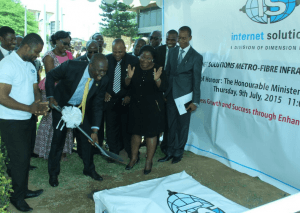Internet Solutions Ghana invests $15m in network

The Pan African telecommunications provider, Internet Solutions (IS), has announced an investment package of $15 million, over the next three years, to expand its network infrastructure to benefit Ghanaians.
Mrs. Yvette Adounvo Atekpe, the Regional Managing Director of the Internet Solutions Ghana, made the announcement, on Monday, at the launch of the company’s Multi-Million Dollar Next Generation Network (NGN) Metro-Ethernet and Metro Fibre Network in Accra.
According to her, the first phase of deployment would be in Accra, with future phases including Kumasi, Takoradi, Cape Coast and a number of other commercial hubs.
She said the expansion would enable the company to meet the growing demand for data, and also ensure the provision of more services for its enterprises and government clients so that they would in turn deliver quality services to their customers and citizens.
“As the demand for more bandwidth continues to grow, this state-of-the-art fibre optic network will have the required capacity to accommodate this growth,” she said.
She said the deployment of the new network would, therefore, enable them to bring in more people and services online, which was vital for sustained socio-economic development.
Dr Edward Omane Boamah, the Minister of Communications, cut the sod for the commencement of the project in Accra.
Mr. George Gabla, the Technology Operations Manager of Internet Solutions Ghana, explained that the fiber optic network was fully compliant with the International Telecommunications Union standard (ITU-T SG15) for Fiber Optics build, and the Metropolitan Ethernet (Metro Ethernet) Network Forum Standards (MEF 2.0) compliance for Metro and Carrier Grade Ethernet networks.
He said the Metro Ethernet referred to using carrier Ethernet technology in metropolitan networks, which was widely used by Corporations, academic institutions and government agencies in large cities to connect branch campuses and offices to the Internet.
“In other words, Metro Ethernet connects business local area networks (LAN) and end users to wide area networks (WAN) or the Internet,” he said.
According to him, the project would be executed by IS in partnership with Tejas Networks, which was also a leading provider of end-to-end optical transport solutions to telecom service providers, and Infratele Solutions Ghana Limited, a leading Outside Station Plant (OSP) Contractor, to build the Metro-Fibre Network.
Mr Gablar said under the terms of the contract, Infratele would build a Telecommunications Grade Metro Fibre network to span all the commercially viable areas in Accra.
Tejas Networks Limited would on the other hand, install its world class flagship ME 2.0 Core Optical Transport equipment (TJ1600), which supported WDM, Carrier Ethernet, TDM in a single core in five Points-of-Presence (PoPs) in Accra, allowing easy connectivity and termination to all organisations within the Metropolis.
He said the network would complement the existing undersea cable systems by providing an access network equal to the task of disseminating the international capacity.
The network, he said, would have an initial capacity of 400 Gigabits per second in a self-healing fibre optic ring for resilience against network outages, plus it was expandable to 3.2 Terabits per second (Tbps) with minimal additional investment.
Mr Sanjay Nayak, the Chief Executive Officer of Tejas Networks Limited, said their partnership with Internet Solutions opened up a world of opportunities as it broke the communication barriers in Ghana and the rest of Africa.
He, therefore, promised their full commitment towards the development of a world class infrastructure throughout Sub-Saharan Africa with internet solutions.
Source: GNA
